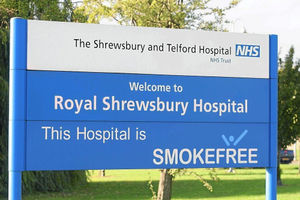'Never event' error at Shropshire health trust
A serious medical "never event" happened last month, according to the trust that controls Shropshire's two main hospitals.

It was one of 10 "serious incidents" recorded by Shrewsbury and Telford Hospital NHS Trust in October.
A report to the trust board, which meets today, says the "never event" was in ophthalmology, which deals with the diagnosis, treatment and prevention of diseases of the eye and visual system.
The never event, named so because they are incidents that guidelines say should never happen, was the first to be recorded by the trust since November last year.
Chief executive of the trust, Simon Wight, said it had involved a "locum", and they had been "terminated immediately" as processes were not followed.
According to the report, which was written by associate director of patient safety Dee Radford, the never event involved an "incorrect lens implant".
It says the trust, which runs Telford's Princess Royal Hospital and Royal Shrewsbury Hospital, was contacted by the Healthcare Safety Investigation Branch as a result.
The report states: "All incidents will be investigated using the trust processes for serious incident investigations and the reports submitted to the commissioners when complete.
"The trust was contacted by the Healthcare Safety Investigation Branch (HSIB) to take part in a national review of never events, specifically around the incorrect insertion of intraocular lenses.
"As the never event we reported was the most recent reported nationally they were keen to visit us as soon as possible and have carried out a review during the week of November 13.
"The team will be visiting other trusts as part of this review and will publish their results in due course.
"Feedback received from the HSIB so far was that trust staff had been open and welcoming to the team which they found extremely helpful."
The other serious incidents recorded in October related to a delay in treatment or delayed transfer, delayed diagnosis, adult safeguarding, a grade three pressure ulcer and complication of surgery.
It is the highest number of serious incidents recorded by the trust within a single month this year.
The report also says that there were three new cases of clostridium difficile, known as C.diff, during October.
It means there have been 18 cases of C.diff since the start of April.
SaTH has been set a target of having no more than 25 cases in a year-long period by NHS England.
C.diff is a type of bacterial infection that can affect the digestive system.
It most commonly affects people who have been treated with antibiotics.
The report states: "Many cases are not preventable and cross Infection is rare.
"However the main issues are failure to send samples pre antibiotics to allow narrowing of antibiotic therapy, failure to follow antibiotic policy or to review antibiotics within 72 hours, and overlong courses of antibiotics.
"There have also been delays in isolating patients when required.
"All of these issues are raised at governance meetings across the trust and medical and nursing staff reminded of the need for regular review of antibiotic prescriptions."




